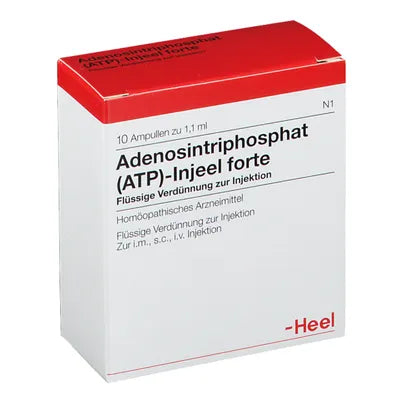Dr. Vita Life
ATP
ATP
Couldn't load pickup availability
ATP (Adenosine Triphosphate) is an organic molecule that is the primary carrier of energy in living cells. It is used in chemical reactions within the cell to meet the body's energy needs. ATP production is vital for maintaining all metabolic activities.
What is ATP?
ATP consists of the base adenine, the sugar ribose, and three phosphate groups. It is central to energy conversion processes within the cell. ATP plays a crucial role in vital processes such as muscle contraction, neurotransmission, protein synthesis, and cell division.
Molecular Structure
- Adenine (nitrogen-based compound)
- Ribose (five-carbon sugar)
- Three phosphate groups (connected by high-energy bonds)
What is ATP used for?
- Provides intracellular energy transfer
- Makes it possible for muscles to contract
- Supports impulse transmission in nerve cells
- Plays a role in protein, carbohydrate and fat synthesis
- It is the energy source in active transport mechanisms
How is ATP produced?
ATP production occurs through three basic biochemical processes:
1. Glycolysis
Takes place in the cell cytoplasm. A small amount of ATP is produced by the breakdown of glucose. It does not require oxygen.
2. Krebs Cycle (Citric Acid Cycle)
It takes place in the mitochondria. It enables the products of glycolysis to be converted into more energy.
3. Electron Transport Chain
It is the most efficient stage of ATP synthesis. This process uses oxygen, producing large amounts of ATP.
ATP Usage Areas
- As an energy source in physical activities
- In biotechnology and laboratory studies
- As a research subject in muscle diseases or mitochondrial disorders
- Performance enhancing supplements (ATP supplements)
Why Are ATP Levels Important?
Low ATP levels are associated with fatigue, muscle weakness, poor cognitive performance, and a general lack of energy. ATP production disorders are particularly evident in chronic fatigue syndrome, mitochondrial diseases, and some neurological disorders.
ATP Supplements
ATP or components that support ATP production (e.g., ribose, creatine, coenzyme Q10) can be used in dietary supplement form. However, the effectiveness of these supplements can vary from person to person, and it is recommended that they be used under the supervision of a specialist.
Things to Know About ATP
- ATP is constantly produced and consumed in the cell
- The human body can produce and consume its own weight in ATP per day.
- Mitochondria are the center of ATP production
- Aerobic respiration is the most efficient way to produce ATP.
Share

Featured collection
-
Testis Compositum
Regular price From 2,564.00TLRegular price





